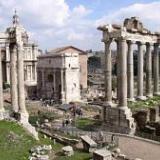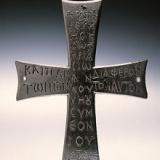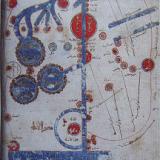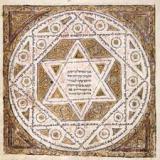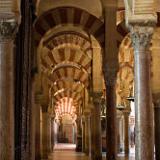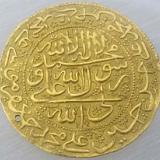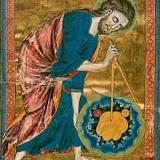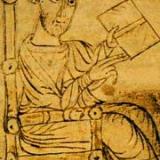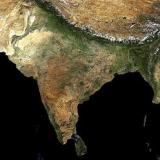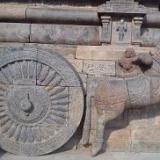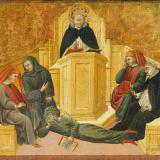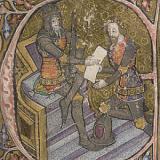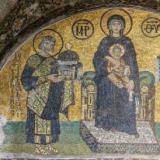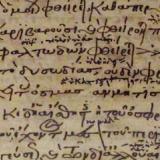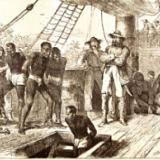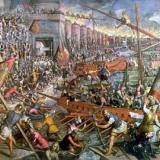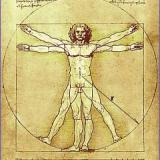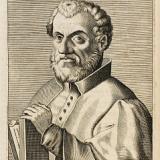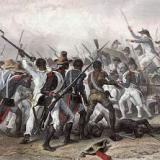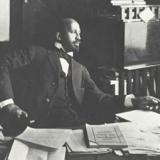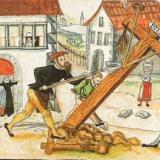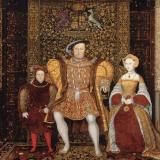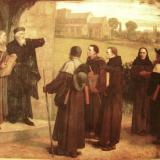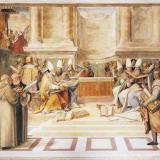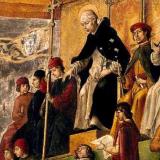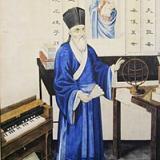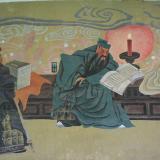Historical Context
Posted on
Peter introduces philosophy in late antiquity, when Aristotelianism and Platonism made a comeback, and pagan philosophy developed alongside Judaism and Christianity.
Posted on
Peter surveys Christian philosophy in the Roman empire, looking ahead to major figures like Origen and Augustine.
Posted on
The rise of Islam creates a new context for philosophy not only among Muslims, but also Jews and Christians.
Posted on
The roots of Jewish philosophy in the Islamic world, focusing on the Rabbinic background in the Mishnah and Talmud, and the thought of early figures like Isaac Israeli.
Posted on
A look at the culture and historical context that made possible a flowering of philosophy among Muslims and Jews in al-Andalus (Muslim-controlled Spain and Portugal).
Posted on
An introduction to later developments in philosophical theology, sufism, and Illuminationism, focusing on the reception and critique of Avicenna.
Posted on
Peter launches the series of podcasts on philosophy in medieval Latin Christendom with a look ahead at what’s to come.
Posted on
Alcuin leads a resurgence of interest in philosophy and the liberal arts at the court of Charlemagne.
Posted on
A whirlwind tour of philosophical literature in India.
Posted on
The Vedic period sets the historical context of the Upaniṣads, Buddhism and Jainism.
Posted on
Two rounds of condemnations at Paris declare certain philosophical teachings as heretical. But what were the long term effects?
Posted on
An introduction to philosophy in the 14th century, focusing on two big ideas: nominalism and voluntarism.
Posted on
A whirlwind tour of developments in Indian philosophy after Dignāga and a few words about the contemporary relevance of the tradition.
See the India timeline here on the site for the various names mentioned in this episode.
Posted on
The host of the History of India podcast joins us for the final episode on India.
Posted on
We begin to look at the third tradition of medieval philosophy, in which the heritage of classical antiquity is preserved and debated by the Byzantines.
Posted on
Is it idolatry to venerate an icon of a saint, or of Christ? The dispute leads the Byzantines to ponder the relation between an image and its object.
Posted on
Without handwritten copies produced by Byzantine scribes, we would know almost nothing about ancient philosophy. How and why were they made?
Posted on
Oliver Primavesi tells us how Greek manuscripts are used to establish the text of authors like Aristotle.
Prof Primavesi runs the Munich School of Ancient Philosophy together with Christof Rapp and Peter Adamson.
Posted on
Historian Judith Herrin joins us to talk about competition and mutual influence between Islam and Byzantium.
Posted on
An introduction to Africana philosophical thought as it emerged from the modern experience of slavery and colonization by Europeans.
Posted on
When the Byzantine empire ended in 1453, philosophy in Greek did not end with it. In this episode we bring the story up to the 20th century.
Posted on
The series on Byzantium concludes as guest Michele Trizio discusses the mutual influence of Byzantium and Latin Christendom.
Posted on
A first look at the themes and figures of philosophy in the Italian Renaissance.
Posted on
Bessarion and George Trapenzuntius, rival scholars from the Greek east who helped inspire the Italian Renaissance.
Posted on
In an age of revolutions and revolutionary ideas, the Haitian Revolution of 1791-1804 stands out as the most radical of them all.
Posted on
By exploring the work and activities of W.E.B. Du Bois around the turn of the twentieth century, we introduce some of the themes of our coverage of that century.
Posted on
How humanism and scholasticism came together with the Protestant Reformation to create the philosophy of 15 - 16th century Europe.
Posted on
The impact of the printing press on the history of philosophy, and its role in helping to trigger the Reformation.
Posted on
An interview on the nature of religious tolerance, and the forms it took during the Reformation and in the thought of early modern thinkers like Locke and Leibniz.
Maria Rosa Antognazza is Professor of Philosophy at King's College London.
Posted on
The historical context of English philosophy in the sixteenth century, with particular focus on Thomas Cranmer, and the role of religion in personal conscience and social cohesion.
Posted on
John Knox polemicizes against idolaters and female rulers, while the humanist George Buchanan argues more calmly for equally radical political conclusions.
Posted on
A leading expert on the history of the Reformation joins us to explain the very different stories of England and Scotland in the 16th century.
Posted on
How the Counter-Reformation or Catholic Reformation created a context for philosophy among Catholics, especially in Spain, Portugal, and Italy.
Posted on
How religious persecution and censorship shaped the context of philosophy in Catholic Europe in the sixteenth century.
Posted on
Iberian expeditions to the Americas inspire scientists, and Matteo Ricci’s religious mission to Asia becomes an encounter between European and Chinese philosophy.
Posted on
The historical context of classical Chinese philosophy, and how ancient Chinese historical works themselves became works of philosophy.

